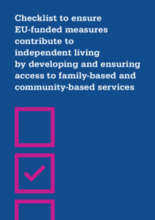Over 1 million EU citizens live in institutions, which segregate them from society and deny them control over their own lives. Many more are at risk of being institutionalised as a result of lack of adequate support services.
EU funding has been instrumental in improving the lives of many of these citizens. It has contributed to the development of new family-based and community-based services. And it has contributed to the transition from institutions to family-based and community-based care for thousands of people.
There have also been instances when EU funding was directed towards institutions, contravening EU’s own policy objectives and legal obligations such as the UN Convention on the Rights of Persons with Disabilities.
This document aims to ensure many more EU citizens benefit from EU funding for inclusion; and to prevent the misuse of EU funds.
The purpose of this checklist is to ensure EU funds in the 2021-2027 programming period contribute to independent living and inclusion in the community. More specifically, the checklist supports desk officers to check the consistency of the measures with the legal and policy frameworks in the fields of:
- Transition from institutional to family-based and community-based services for children, persons with disabilities, persons with mental health problems and elderly persons
- Development of quality family-based and community-based services
- Prevention of separation of children, including with disabilities, from their families
- Prevention of segregation and institutionalisation of children, persons with disabilities, persons with mental health problems, older people and homeless people, regardless of the residence status.

